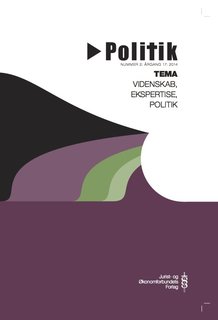Ekspertens brød, den intellektuelles død? Politik, viden og teknologi under den nukleare revolution
DOI:
https://doi.org/10.7146/politik.v17i2.27575Abstract
The relationship between science and politics is not singular. In this article we focus on the thermonuclear revolution that resulted in dramatic changes to modern knowledge economies. During the 1950s and early 1960s the production of scienti c knowledge was increasingly militarized and a general trend in the role of knowledge providers – away from the sage or intellectual and towards the expert – was accelerated. ere were, however, countertrends. We describe how some of the most signi cant and thoroughgoing critique of the nuclear age was formulated on the margins of or outside the academic world by a group of thinkers (that we term nuclear realists). For these thinkers, the thermonuclear revolution became the catalyst for new visions of global politics that sought to undermine and transgress the ideological rationale behind national security and the establishment of the military-industrial complex, particularly in the United States. Although the historical analysis of the thermonuclear revolution constitutes an extreme case, it harbours signi cant chal- lenges in relation to the nexus between politics, scienti c knowledge and global politics.
Downloads
Published
How to Cite
Issue
Section
License
Forfattere, der publicerer deres værker via dette tidsskrift, accepterer følgende vilkår:
- Forfattere bevarer deres ophavsret og giver tidsskriftet ret til første publicering, samtidigt med at værket er omfattet af en Creative Commons Attribution-licens, der giver andre ret til at dele værket med en anerkendelse af værkets forfatter og første publicering i nærværende tidsskrift.
- Forfattere kan indgå flere separate kontraktlige aftaler om ikke-eksklusiv distribution af tidsskriftets publicerede version af værket (f.eks. sende det til et institutionslager eller udgive det i en bog), med en anerkendelse af værkets første publicering i nærværende tidsskrift.
- Forfattere har ret til og opfordres til at publicere deres værker online (f.eks. i institutionslagre eller på deres websted) forud for og under manuskriptprocessen, da dette kan føre til produktive udvekslinger, samt tidligere og større citater fra publicerede værker (se The Effect of Open Access).

